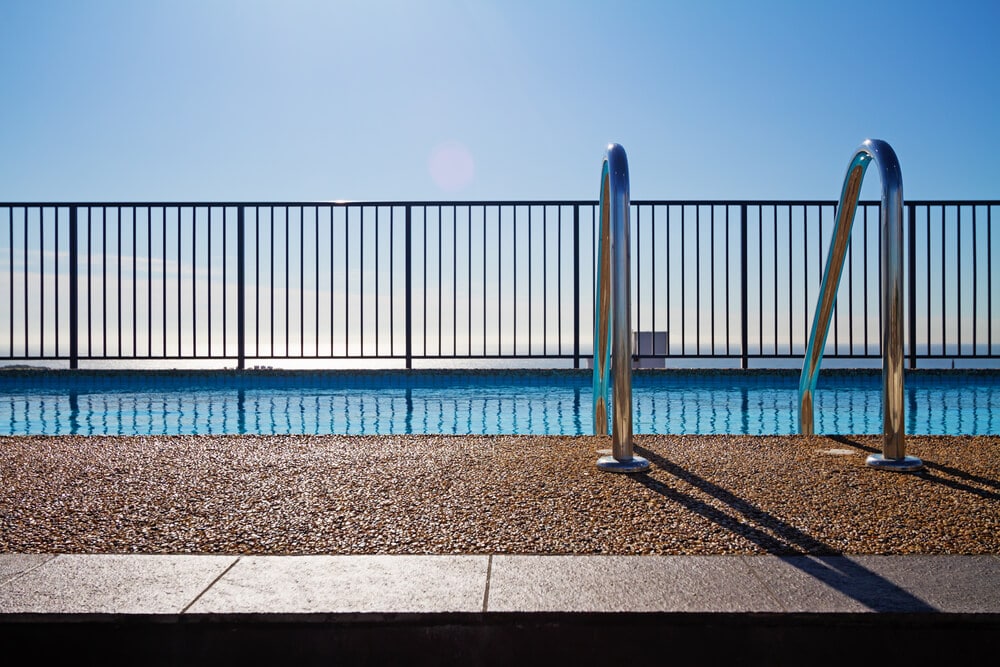

Whether you are in the city or in a rural area, one of the requirements of owning an indoor pool is that it should have a proper pool fence around it. Proper fencing guidelines have been set forth by the Consumer Safety Product Commission (CPSC). Basic requirements by the CPSC include:
- Minimum height of the fence should be 48″ tall
- Spaces in between the vertical slats should be no more than 4″
- The space between the fence and the ground must be less than 4″
- Openings must be less than 1-3/4″ for chain link or latticed fences
- It should have no holes or protrusions, which may aid someone to climb over the fence- the fence should be non-climbable
- Some states may require gate alarms
- The fence should have self-latching gates to automatically close once someone passes through.
Inground Pool Fences
Pool fences come in various material options and styles. A good fencing option should be able to meet both your needs and the requirements of the fence codes. It should also accommodate your budget and not over-stretch your purchasing limits. Common pool fence types include:
Glass Pool Fences
Although glass fences are probably the second most expensive option after wrought iron fences, they are the best type. The main reason I would recommend glass fences is because they are very stylish. Imagine a glass panel surrounding your pool. It is a beautiful feeling and makes swimming worthwhile. Many people shy away from them because they assume that they are fragile since they are made of glass. This is far from the truth.
As explained by Clear Choice Pool Fencing who installs glass pool fencing in Perth, the fences are created from tempered glass, which is very hard to break. Furthermore, they come in various thicknesses. They may be 8mm, 10mm, or 12mm thick. The latter is usually recommended by most suppliers because the likelihood of them breaking is close to none. Glass fencing is actually the safest pool fencing option because children cannot climb over the slippery glass.
They are also easy to install. With a DIY manual, you can easily connect the brackets at the end of each panel. The only problem with glass fences is that they easily catch dirty. So they require regular washing for visibility. If privacy is what you are looking for, then this is not the type for you.
Wrought Iron Fences
Wrought iron is the most expensive fencing material. It is the most sturdy. The iron can be cast into different shapes and sizes. These fences are therefore very stylish and they improve the general appearance of the pool area. They tend to last for a long time, it is important to carry out proper maintenance on these fences because iron rusts.
Aluminum Pool Fences
Although they are similar to wrought iron fences, aluminum fences do not rust. They are not costly and are extremely strong. Their modular designs are easy to assemble and they do not require painting because they do not rust. Due to their durability and low-cost nature, aluminum fences have replaced wrought iron fences as the most preferred type of fencing. Regular maintenance should be performed on these fences in areas with high temperatures and salty weather, as these conditions corrode them overtime over time
Pool Fences
This is the best choice for you if you want a bit of privacy. Since you cannot see through them, keeping an eye on your pool may pose a challenge. The most popular woods used include cedar, redwood, pine, and ash. The biggest challenge with these types of fences is that they require regular maintenance. You will need to be stain and paint them periodically to prevent insects and birds from destroying them. Waterproofing is also essential to prevent the wood planks from rotting.
Vinyl Pool Fences
They come in a wide variety of styles and patterns. They are also weather-resistant and very easy to install. However, they usually crack and wear out when exposed to the hot sun for a very long time. Whether you want to have a see-through fence or not depends on the size of the panels you will use. You can opt for large panels with tiny spaces between them if you want total obstruction from the pool. Or, you may install tiny picket fences with enough space to view through them.
Mesh Pool Fences
This is a temporary fencing option. It is usually installed as a safety measure to keep young kids away from the pool. It is among the cheapest fences and is easy to both install and remove. It is however less durable than other fencing material. The mesh can easily deteriorate if not properly handled and maintained.
Faux Stone Pool Fences
They are the best alternative when it comes to privacy. They are sturdy and crack resistant and can last for a very long time. Faux stones have that feel and look of natural stone, although their costs are not as costly as real stone walls. They are resistant to all weather conditions and can withstand physical force, such as repeated hits from a baseball.
Faux stones are also resistant to graffiti or paintings. If your child makes a colorful drawing on it, do not punish him/her. A simple citrus-based cleaner will do the trick. They do not require maintenance apart from the occasional washing when your child makes a painting on it.
